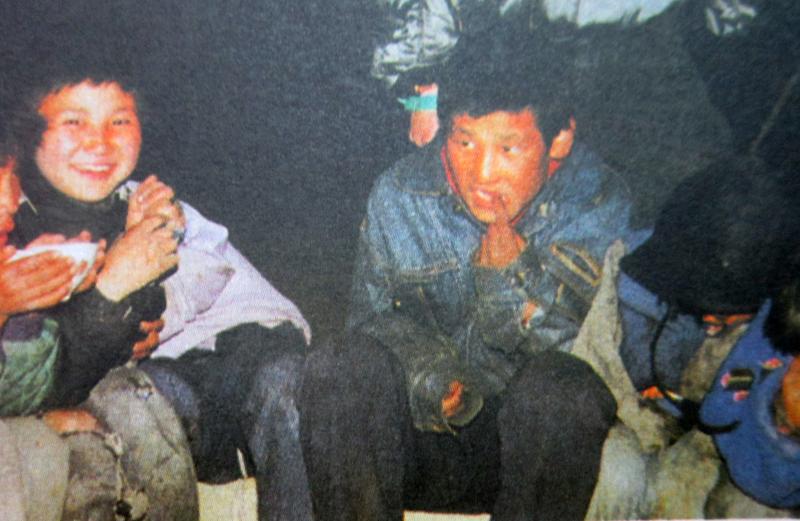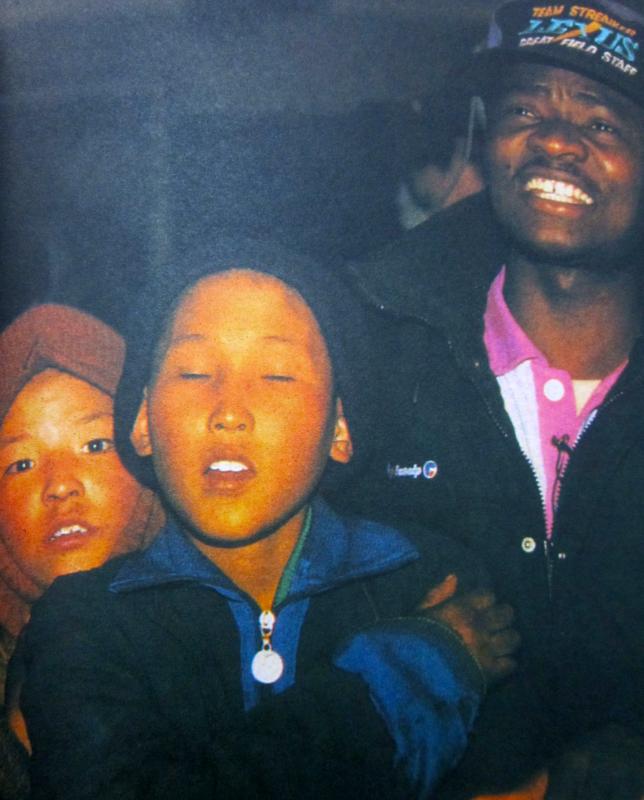Teacher Mutombo
By Fr. Wens Padilla CICM

Mongolia Flag
Father Wens Padilla, CICM, a native of Tubao, La Union, Philippines, joined the CICM in 1972 and was ordained in 1976. The next year he was sent to the missions of Taiwan, where he served in parish apostolate. He was Provincial Superior of the CICM Chinese Province from 1986 to 1992, when he was appointed, together with two other confreres, to become the first Catholic missionaries to go back to outer Mongolia. Today there are six CICM men in Ulaanbataar, the capital of Mongolia. One young Zairian intern confrere died in April. Father Wens, the Superior of the District of Mongolia, tells us about Teacher Mutombo.
Sad Birthday
I’m writing this reflection on the very feast of the Assumption which is at the same time the birth anniversary of Lievin Mukenga Mutombo, a young CICM student from Zaire. But Lievin is dead! He left the Mongolian Mission on April 27, 1996 and died suddenly on May 11, 1996 in Hong Kong while attending a Session for Interns. He was on his way to the Philippines for his Theology studies.
Love for our Lady
Lievin told me that he joined the Congregation of the Immaculate Heart of Mary due to his devotion to the Blessed Virgin Mary. And indeed he took refuge in her motherly care and protection whenever he was in trouble. He taught the youth of the mission (of whom he was so fond and to whom he was so strongly attached) to pray the rosary in the vernacular. In May and October the youth were fervent in praying the rosary at least twice a week.
We Miss Him
Mongolian Mission on Trial. On this very day of his anniversary, I can’t cry hard enough for him to hear me! He’s gone! We don’t hear “MUTOMBO BAGSH” (Teacher Mutombo) shouted again on the streets by the numerous street children whom he loved and knew so well. His death put the newly established Catholic mission to the test. His enthusiasm and dedication to the young people. Street children and the poor paved the way in founding the Catholic Church presence in this non-Christian nation.
Changed not Ended

Street children are being fed by members of the youth group
His mission has changed, not ended. Those who have known how Brother Lievin worked would say “His mission was accomplished!” But others would say “His mission has changed, not ended.” I for one am convinced of the latter. The last letter he wrote me three days before he died reads: “I really assure you that one way or another I will work with you for the good of the Mongolian mission of which you are the Superior. I always pray for you and for the success of the mission given to you by the Holy See. Please pray also for me so that one day we will be together again. I really like Mongolia, the Mongolian people, and also the Mongolian mission. I do not wish to stay out of the Mongolian mission.”
If indeed Lievin likes to work in one way or another with us for the good of the Mongolian mission; and if he does not wish to stay out of the Mongolian mission, then I believe that he continues actively his ministry for Mongolia.
When is He Coming Back
People who don’t know that he died keep asking me when he is coming back. The children of the Street Children Center remember him so dearly. For them the words “MUTOMBO BAGSH” are precious. The street children were happy, secure, cared for and loved when Lievin was around.
ERDENEBAYAR

Erdenebayar is a boy of eight who misses teacher Mutombo so much that on a Monday morning (two days after Brother Lievin’s death) Erdenebayar refused to go to school. He said he didn’t want to go to school because he needed to wait for his beloved teacher. Without telling the teacher in charge where he would wait for ‘Mutombo Bagsh’, and clad in his favorite shirt & cap (seemingly given by Lievin), he left the center unnoticed. A futile search by the caretakers of the center followed. It was learned when he she showed up in the late afternoon that he had gone to the airport to wait for his ‘teacher.’
Arriving at the apartment where the wake for Brother Lievin was being observed, he made his reverential bow before the picture of Lievin displayed on a low table flanked by burning candles and incense. Afterwards, he sat on the easy chair usually occupied by Lievin and cried his heart out. After some time he slept. The people attending the wake were amazed and moved by Erdenebayar’s devotion to his deceased teacher. At this boy’s age, Lievin’s impact on him must have been very profound and deep. Erdenebayar is still in the Children’s Center. He is full of mischief but very much loved by the caretakers and by us missionaries. In him lives the memory of "Mutombo Bagsh.”
Lievin’s own description of the youth work
The young people have divided their activities into two dimensions. One is their growing in body and spirit; the other is their apostolate in social work. For their human and spiritual formation there are doctrine classes for the members of the group. They have Bible sharing and other people are invited to join them. English lessons are also provided.
For the second dimension, the young people are very much involved in the social work according to their interests and talents. They go to the Rehabilitation Center for the elderly run by Dr. E. Adya. In this government institution they talk to the elderly and groom their nails and hair. While the girls clean the kitchen, the boys bring coal to warm the center so that the residents so not literally freeze to death.
At night the young people go to visit the street children in the tunnels and the stairwells where they sleep to protect themselves from the harsh winter of Mongolia. At the same time they visit with the elderly who pass their nights in the stairwells of apartments. They share with them their life, bring tea, bread and cookies. They try to get a place for them and help then in claiming their pension from the government.
Once a week, they bathe the street children at the public showers. They visit the elderly who have no one to care for them. They prepare their clothes and clean their homes. They also visit poor families and bring wood to heat their gers (Mongolian tent). They encourage them to work and they help them find work so they will not starve.
The youth are inspired by the words of Jesus: “I assure you, as often as you did it for one of my least brothers and sisters, you did it for me.” (Matt 25, 40). The young people give witness and evangelize others through all these activities. They would like to do more but they need human and material support. From their own efforts they bake special cookies and sell them to generate income to help the homeless. Through all these activities, the Catholic Mission in Mongolia tries to propagate the Good News of Jesus.
